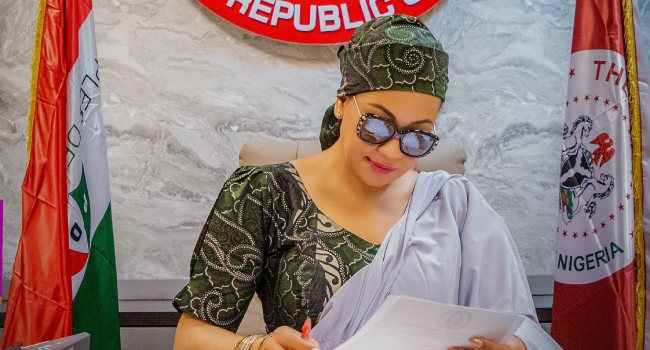Senator Natasha Akpoti-Uduaghan has penned a fiery and satirical “apology” to Senate President Godswill Akpabio, reigniting conversations about gender dynamics and power struggles within Nigeria’s legislative chambers.
In a letter laced with biting sarcasm, Senator Akpoti-Uduaghan offered profuse apology to Senate President Godswill Akpabio over the “grievous crime” of maintaining dignity and self-respect in the presence of the Senate President.
The letter read in part: “Dear Distinguished Senate President Godswill Akpabio,It is with the deepest sarcasm and utmost theatrical regret that I tender this apology for the grievous crime of possessing dignity and self-respect in your most exalted presence…”
She continued, mocking what she implied were unwritten expectations of compliance, adding: “How remiss of me not to understand that my refusal to indulge your… ‘requests’ was not merely a personal choice but a constitutional violation of certain men’s entitlement.”
Taking a direct swipe at systemic sexism, she wrote: “Please find it in your magnanimous heart somewhere buried deep beneath layers of entitlement to forgive this stubborn woman who mistakenly believed that her seat in the Senate was earned through elections, not erections.”
The sour relationship between Sen. Akpoti-Uduaghan and Senate President Akpabio was first brought to public attention in July, 2024, when Sen. Akpabio, at a plenary session, frowned at her attempt to speak without official recognition, saying, “we are not in a nightclub.”
The comment was widely condemned by mainly gender activists as sexist, sparking public outrage and demanding an an apology.
While Akpabio later issued a statement insisting that he meant no harm and that he respects women, the tension only deepened.
In February, 2025, Sen. Akpoti-Uduaghan officially accused the Senate President of sexual harassment, alleging inappropriate comments and advances.
Although she submitted a petition to the Senate leadership, it was dismissed on procedural grounds.
Shortly thereafter, the Senate suspended her for six months over unrelated conduct — a move several Nigerians saw as a retaliation to silence her.
Her suspension thereafter, triggered nationwide protests under the slogan “We are all Natasha,” with women rights groups and activists rallying in her defense and denouncing gender-based discrimination in Nigerian politics.
While groups like the “Kogi Patriotic Consultative Assembly” urged the senator to apologize and move forward, several Nigerians celebrate her defiant stance, hailing her as a symbol of resistance against entrenched systemic bias.
Senate President Akpabio, on his part, has denied all allegations of misconduct, branding Senator Akpoti-Uduaghan’s claims as “baseless” and “malicious.”
He has also threatened to pursue legal action for what he described as defamation and character assassination.
And analysts say Natasha-Uduaghan’s satirical letter will open other vistas that could further worsen the political environment.









